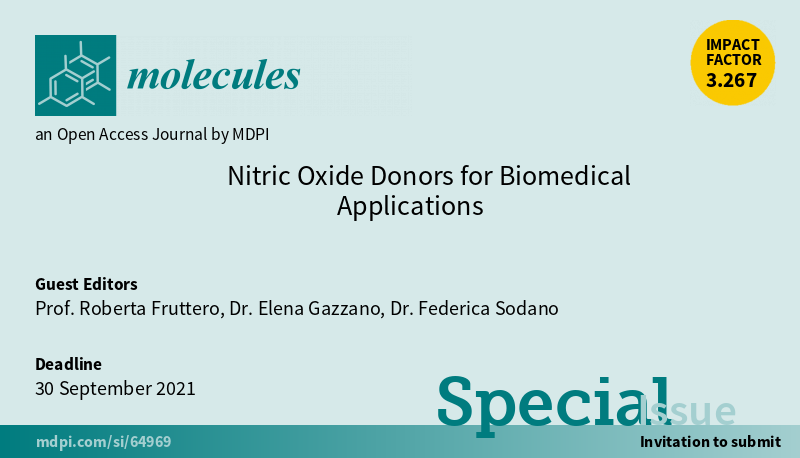Special Issue “Nitric Oxide Donors for Biomedical Applications” has been Launched
Guest Editors are STRATAGEM members Prof. Roberta Fruttero, Dr. Federica Sodano from the Department of Drug Science and Technology, University of Turin and Dr. Elena Gazzano from Department of Life Sciences and Systems Biology, University of Turin. The A New Special Issue is Open for Submissions in Molecules MDPI.
This is one of many special issues, guest edited by STRATAGEM members in 2021 and is separate from the STRATAGEM-sponsored Special Issue, more information about which can be found at the website of Cancers MDPI.
Nitric oxide (NO) is a ubiquitous and pleiotropic messenger that is involved in many physiological and pathophysiological processes in nearly every organ system. It is a free radical with protective and regulatory functions in the cardiovascular and central/peripheral nervous systems. NO also plays a key role in innate immunity and inflammation since it is a necessary component of nonspecific defense mechanisms for several pathogens, including bacteria, viruses, parasites, and fungi. The difficulties inherent in handling NO, due to its gaseous nature and reactivity, have led to the development of a number of NO donors—that is, compounds that can release NO under physiological conditions. NO donors have shown broad therapeutic potential against cardiovascular pathologies, tumors, bacterial and microbial infections, and in the maintenance of homeostasis in gastrointestinal and respiratory tracts. In recent years, the combination of NO donors and cytotoxic agents has also been proposed as a valid strategy for reversing the multidrug resistance (MDR) that is often encountered in conventional anticancer therapies. Since the biological effects of NO are strictly dependent on its concentration, NO delivery should be controlled with great accuracy, in terms of space, time, and dosage. Light-triggered NO donors and suitable nanosystems have been developed for regulated spatiotemporal release, and are promising new therapeutic devices. In fact, light and nanocarriers are the most finely tunable approach for the non-invasive delivery of NO to the desired biological environments. In this Special Issue “Nitric Oxide Donors for Biomedical Applications”, we aim to collect both original papers and up-to-date reviews that focus on the design, synthesis, and biological effects of new NO donors, with particular attention being paid to NO-photoreleasing compounds and controlled NO-release nanosystems. As Guest Editors, we encourage researchers working in this area to contribute to this Special Issue of
Molecules with their recent studies. /Molecules/ (ISSN 1420-3049), an open access journal, is publishing a Special Issue entitled “Nitric Oxide Donors for Biomedical Applications” and has approached me to guest edit this themed issue. In this regard, I would be very pleased if you would agree to contribute either an original research paper, a short communication, or a focus review to this issue. Provided below is some information that you may find useful in your consideration of this invitation.
(1) For more details, please see:
https://www.mdpi.com/journal/molecules/special_issues/Nitric_Oxide_Donors(2) Currently, the median time from submission to first decision in Molecules is approximately 12 days. The median time from submission to final publication is around 30 days, which is attributed to the rapid production processing of the papers upon acceptance of the manuscript.
(3) The submission deadline is *30 September 2021*. You may send your manuscript now or up until the deadline, as papers will be published on an ongoing basis after being processed. For more details about the submission process, please see http://www.mdpi.com/journal/molecules/instructions
(4) Molecules is fully open access. Open access (unlimited and free access by readers) increases publicity and promotes more frequent citations, as indicated by several studies. Open access is supported by the authors and their institutes. Article Processing Charges of CHF 2000 (APC) apply to accepted papers. STRATAGEM members may be entitled to a 20% discount for each submission and should inform the Guest Editors of their interest in putting together a manuscript for this Issue.Source: Molecules MDPI
Back to Events / News

